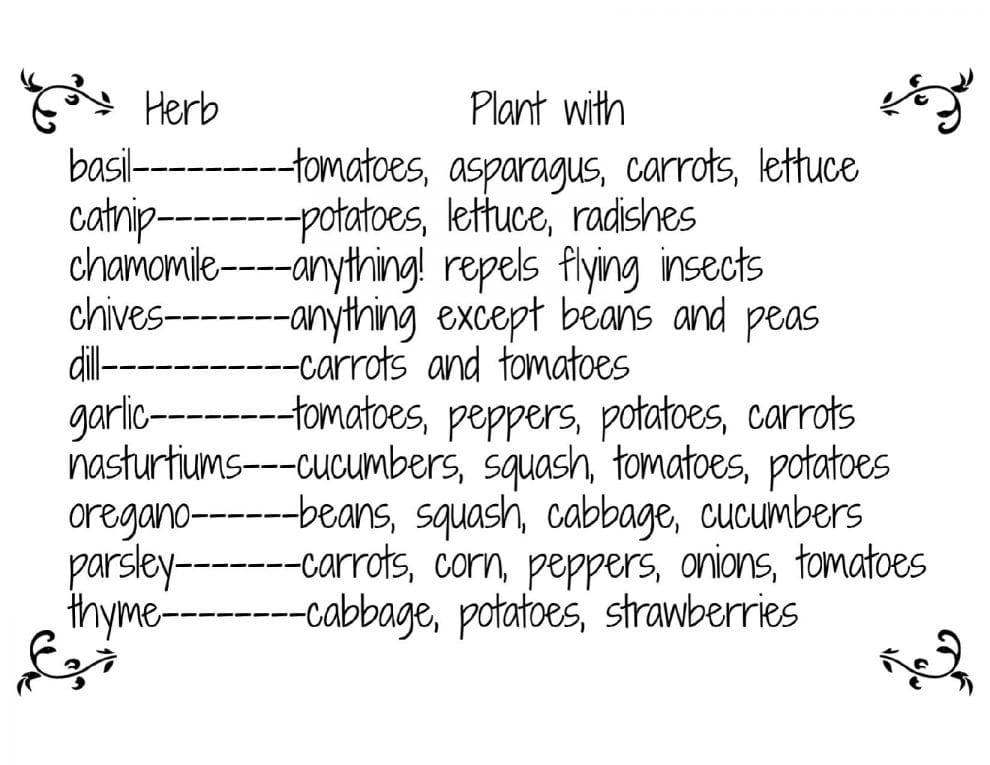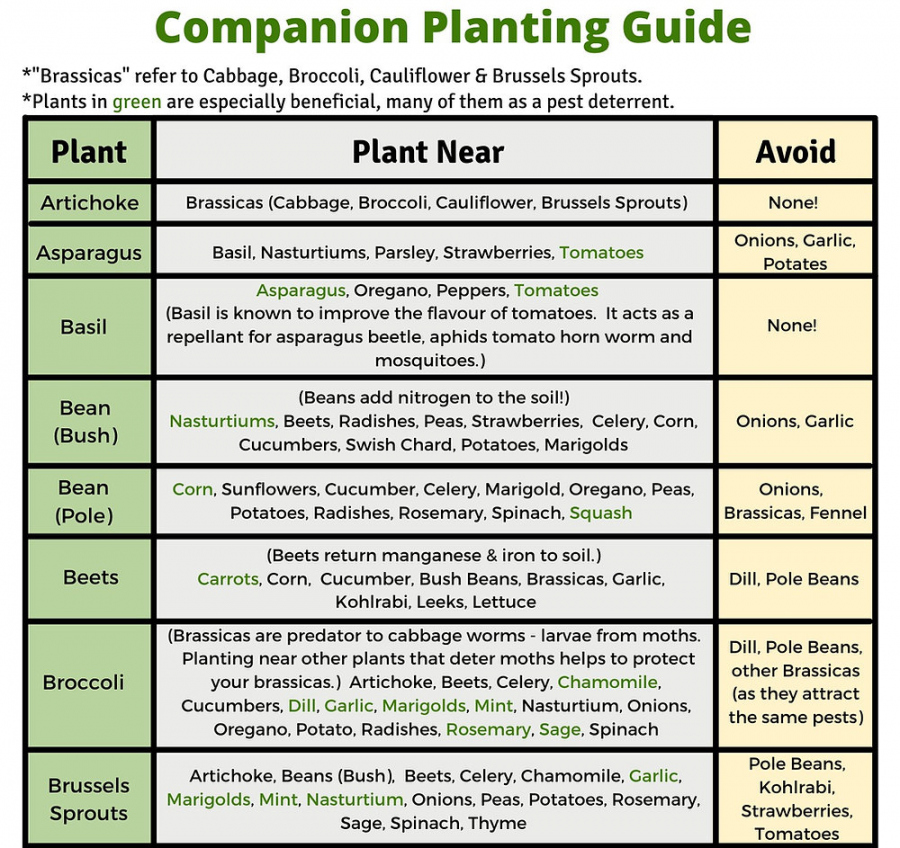Printable Companion Planting To Deter Pests
Printable Companion Planting To Deter Pests - Known for their ability to deter pests like cucumber beetles, they offer a natural form of pest control. Companion planting offers gardeners a natural way to protect their vegetable crops from common pests. To keep insects, worms, and rodents at bay, expert gardeners suggest companion planting, which acts as a natural deterrent amongst your flowers and veggies to confuse bugs'. The secret lies in companion planting—pairing your arugula plant with the right neighbors to boost growth, deter pests, and enhance flavor. Here are a handful of my favorite plants for discouraging pests in the vegetable garden to jumpstart your companion planting endeavors. This method not only controls pests but also boosts plant health. Get the ultimate tool for planning your vegetable. Here are eight companion plants that pair well with watermelon, offering benefits such as. Companion planting can help improve the health and yield of your plants, as well as deter pests and attract beneficial insects. Whether you’re looking for the. Companion planting can boost soil fertility and. Some companion plants, such as marigolds and nasturtiums, have strong scents that can repel pests. This gardening method encourages biodiversity, improves crop yields, and reduces. Ions, garlic, ramps, chives, leeks,. Growing watermelon alongside certain plants can enhance growth and deter pests. Others, such as basil and mint, have oils that can repel pests. To keep insects, worms, and rodents at bay, expert gardeners suggest companion planting, which acts as a natural deterrent amongst your flowers and veggies to confuse bugs'. What is companion planting and why is it beneficial? Basil can ward off flies and mosquitoes while enhancing the flavor of tomatoes. Discover the benefits of companion planting with our printable chart. By creating a planting plan that incorporates. By strategically placing certain plants together, it’s possible to deter harmful insects. If you’re ready to take your garden to the next level, consider implementing printable planting strategies to keep pests at bay. Some plants repel pests while others improve soil quality or attract helpful pollinators. What is companion planting and why is. In some cases a plant like basil will deter pests from destroying your tomatoes or peppers. Companion planting has many benefits. The secret lies in companion planting—pairing your arugula plant with the right neighbors to boost growth, deter pests, and enhance flavor. Discover the benefits of companion planting with our printable chart. Get the ultimate tool for planning your vegetable. Some companion plants, such as marigolds and nasturtiums, have strong scents that can repel pests. Companion planting can boost soil fertility and. In some cases a plant like basil will deter pests from destroying your tomatoes or peppers. Companion planting can help improve the health and yield of your plants, as well as deter pests and attract beneficial insects. Others,. Companion planting involves growing different plants together to naturally. Other partner plants help the soil retain moisture, like. To keep insects, worms, and rodents at bay, expert gardeners suggest companion planting, which acts as a natural deterrent amongst your flowers and veggies to confuse bugs'. Whether you’re looking for the. When you plant marigolds near vegetables like. I’m not a huge fan of spraying chemicals all over my veggies. When you plant marigolds near vegetables like. Some companion plants, such as marigolds and nasturtiums, have strong scents that can repel pests. Plants that repel pests, such as marigolds and basil, can be used to help control pest populations and reduce the need for external inputs. Basil can. What is companion planting and why is it beneficial? Here are eight companion plants that pair well with watermelon, offering benefits such as. Enhance nutrient absorption, control pests, and increase crop yield in your garden. This method not only controls pests but also boosts plant health. By strategically planting certain crops together, gardeners can improve plant health, enhance flavours, repel. Companion planting offers gardeners a natural way to protect their vegetable crops from common pests. Discover the benefits of companion planting with our printable chart. Here are eight companion plants that pair well with watermelon, offering benefits such as. Ions, garlic, ramps, chives, leeks,. Basil can ward off flies and mosquitoes while enhancing the flavor of tomatoes. Enhance nutrient absorption, control pests, and increase crop yield in your garden. Growing watermelon alongside certain plants can enhance growth and deter pests. What is companion planting and why is it beneficial? Companion planting offers gardeners a natural way to protect their vegetable crops from common pests. Companion planting has many benefits. Companion planting can boost soil fertility and. Plants that repel pests, such as marigolds and basil, can be used to help control pest populations and reduce the need for external inputs. Enhance nutrient absorption, control pests, and increase crop yield in your garden. To keep insects, worms, and rodents at bay, expert gardeners suggest companion planting, which acts as a. Companion planting involves growing different plants together to naturally. Corn squash (see winter squash) ey and asparagus mutually benefit their growth, and parsley rep. The secret lies in companion planting—pairing your arugula plant with the right neighbors to boost growth, deter pests, and enhance flavor. Get the ultimate tool for planning your vegetable. Whether you’re looking for the. Use plants that repel pests: Here are a handful of my favorite plants for discouraging pests in the vegetable garden to jumpstart your companion planting endeavors. Some companion plants, such as marigolds and nasturtiums, have strong scents that can repel pests. Discover the benefits of companion planting with our printable chart. This gardening method encourages biodiversity, improves crop yields, and reduces. Get the ultimate tool for planning your vegetable. Companion planting can help improve the health and yield of your plants, as well as deter pests and attract beneficial insects. Plants that repel pests, such as marigolds and basil, can be used to help control pest populations and reduce the need for external inputs. In some cases a plant like basil will deter pests from destroying your tomatoes or peppers. Companion planting offers gardeners a natural way to protect their vegetable crops from common pests. Potato companion plants such as beans, cabbage, eggplant, peas, and corn can improve growth and deter pests. From edible plants to flowers, there are a handful of plants that can help prevent diseases, deter pests, and provide shade for nearby company. Companion planting can boost soil fertility and. Known for their ability to deter pests like cucumber beetles, they offer a natural form of pest control. Some plants repel pests while others improve soil quality or attract helpful pollinators. Others, such as basil and mint, have oils that can repel pests.Companion Planting Flowers to Deter Garden Pests Family Food Garden
Vegetable Companion Planting Includes Printable Backyard Vegetable
Printable Companion Planting Chart Know which vegetables can be
Companion Planting 10 Herbs That Repel Garden Pests Hip Homeschool Moms
Free Printable Printable Companion Planting Chart FREE Printable HQ
How to switch to organic gardening
Printable Companion Planting Chart
Herb Companion Planting, Plant Benefits, Homestead Gardens, Natural
Companion Planting Chart and Guide for Vegetable Gardens Secret Life
Free Printable Companion Planting Chart Companion planting chart
Ions, Garlic, Ramps, Chives, Leeks,.
To Keep Insects, Worms, And Rodents At Bay, Expert Gardeners Suggest Companion Planting, Which Acts As A Natural Deterrent Amongst Your Flowers And Veggies To Confuse Bugs'.
Basil Can Ward Off Flies And Mosquitoes While Enhancing The Flavor Of Tomatoes.
Radishes Are A Classic Companion Plant For Squash.
Related Post:









